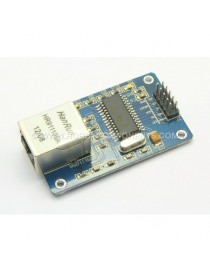Il modulo ethernet ENC28J60 utilizza il nuovo Microchip ENC28J60 Stand-Alone Ethernet Controller IC
adatto per la maggior parte dei protocolli.
Descrizione:
- Ethernet LAN Module for Arduino/AVR/LPC/STM3
- ENC28J60 Ethernet chips
- Montato facilmente su MCU
- Network Interface: HR911105A
- Alimentazione: 3.3 V (5V Tolerant DIO)
- 25Mhz oscillatore a crsitalli
- Dimensione (L x W x H): Approx. 2.3 x 1.3 x 0.7 inch / 58 x 34 x 17 mm
| PINOUT |
|---|
| PIN |
DESCRIPTION |
| 1 |
CLK OUT |
| 2 |
INT |
| 3 |
WOL |
| 4 |
SO |
| 5 |
SI |
| 6 |
SCK |
| 7 |
CS |
| 8 |
RES |
| 9 |
+3.3V |
| 10 |
GND |
ARD_Ethernet_Module_HCARDU0028_Example.pde
/* FILE: ARD_Ethernet_Module_HCARDU0028_Example.pde
DATE: 28/07/12
VERSION: 0.1
This is an example of how to use the HobbyComponents Arduino ethernet shield
(HCARDU0028). For this example to work you will need to download the appropriate
libraries available at:
http://forum.hobbycomponents.com/viewtopic.php?f=25&t=6
Unzip both libraries and copy them to your Arduino libraries folder.
This program will serve a basic webpage at the ip address specified below which will
allow you change the state of 4 relays. This program is intended to work with arduino
relay modules such as the HobbyComponents 4 channel relay module (HCARDU0025).
CONNECTIONS:
ETHERNET MODULE ARDUINO BOARD
PIN 1 (CLK OUT) N/A
PIN 2 (INT) N/A
PIN 3 (WOL) N/A
PIN 4 (SO) DIO 12
PIN 5 (SI) DIO 11
PIN 6 (SCK) DIO 13
PIN 7 (CS) DIO 10
PIN 8 (RES) N/A
PIN 9 (VCC) +3.3V
PIN 10 (GND) GND
You may copy, alter and reuse this code in any way you like but please leave
reference to HobbyComponents.com in your comments if you redistribute this code. */
/* Include both ethernet libraries */
#include ""etherShield.h""
#include ""ETHER_28J60.h""
#define RELAY1_DIO 2 /* DIO pin used to drive relay 1 */
#define RELAY2_DIO 3 /* DIO pin used to drive relay 2 */
#define RELAY3_DIO 4 /* DIO pin used to drive relay 3 */
#define RELAY4_DIO 5 /* DIO pin used to drive relay 4 */
#define RELAY1_MASK 0 /* Bit mask for storing state of relay 1 */
#define RELAY2_MASK 1 /* Bit mask for storing state of relay 2 */
#define RELAY3_MASK 2 /* Bit mask for storing state of relay 3 */
#define RELAY4_MASK 3 /* Bit mask for storing state of relay 4 */
/* Used to store the current state of the relays */
int RelayState = 0;
/* MAC address of the ethernet shield. If you are using this on your
own network then the MAC address below will be fine, but remember if
you use more than one shield on your network they will need to be assigned
unique MAC addresses */
static uint8_t mac[6] = {0x54, 0x55, 0x58, 0x10, 0x00, 0x24};
/* The IP address of the shield. Make sure this matches the IP
address range of your network and is not in use by any other
device on it */
static uint8_t ip[4] = {192, 168, 1, 55};
/* The port number the shield will respond to. Use port 80
for standard HTTP requests */
static uint16_t port = 80;
ETHER_28J60 e;
/* Initialise the ethernet interface and DIO pins */
void setup()
{
e.setup(mac, ip, port);
pinMode(RELAY1_DIO, OUTPUT);
pinMode(RELAY2_DIO, OUTPUT);
pinMode(RELAY3_DIO, OUTPUT);
pinMode(RELAY4_DIO, OUTPUT);
}
/* Main program */
void loop()
{
char* EthernetData;
/* Has a page request been made? */
if (EthernetData = e.serviceRequest())
{
/* Has the page link for relay 1 been pressed? */
if (strcmp(EthernetData, ""?relay=1"") == 0)
{
/* If so then change the state of relay 1 */
if (bitRead(RelayState, RELAY1_MASK))
{
bitClear(RelayState, RELAY1_MASK);
digitalWrite(RELAY1_DIO, LOW);
}else
{
bitSet(RelayState, RELAY1_MASK);
digitalWrite(RELAY1_DIO, HIGH);
}
}
/* Has the page link for relay 2 been pressed? */
if (strcmp(EthernetData, ""?relay=2"") == 0)
{
/* If so then change the state of relay 2 */
if (bitRead(RelayState, RELAY2_MASK))
{
bitClear(RelayState, RELAY2_MASK);
digitalWrite(RELAY2_DIO, LOW);
}else
{
bitSet(RelayState, RELAY2_MASK);
digitalWrite(RELAY2_DIO, HIGH);
}
}
/* Has the page link for relay 3 been pressed? */
if (strcmp(EthernetData, ""?relay=3"") == 0)
{
/* If so then change the state of relay 3 */
if (bitRead(RelayState, RELAY3_MASK))
{
bitClear(RelayState, RELAY3_MASK);
digitalWrite(RELAY3_DIO, LOW);
}else
{
bitSet(RelayState, RELAY3_MASK);
digitalWrite(RELAY3_DIO, HIGH);
}
}
/* Has the page link for relay 4 been pressed? */
if (strcmp(EthernetData, ""?relay=4"") == 0)
{
/* If so then change the state of relay 4 */
if (bitRead(RelayState, RELAY4_MASK))
{
bitClear(RelayState, RELAY4_MASK);
digitalWrite(RELAY4_DIO, LOW);
}else
{
bitSet(RelayState, RELAY4_MASK);
digitalWrite(RELAY4_DIO, HIGH);
}
}
/* Generate a new page with the current states of the relays */
iUpdateRelays(RelayState);
/* And send it back to the IP address that made the request */
e.respond();
}
}
/* This funtion generates a web page that shows the current state of
the 4 relays and creates links to allow their states to be toggled.
It requires a register of type int that holds the current state of
the relays to be passed to it */
void iUpdateRelays(int RelayState)
{
e.print(""
Web Remote
"");
if (bitRead(RelayState, RELAY1_MASK))
{
e.print(""RELAY 1: ON
"");
}else
{
e.print(""RELAY 1: OFF
"");
}
if (bitRead(RelayState, RELAY2_MASK))
{
e.print(""RELAY 2: ON
"");
}else
{
e.print(""RELAY 2: OFF
"");
}
if (bitRead(RelayState, RELAY3_MASK))
{
e.print(""RELAY 3: ON
"");
}else
{
e.print(""RELAY 3: OFF
"");
}
if (bitRead(RelayState, RELAY4_MASK))
{
e.print(""RELAY 4: ON
"");
}else
{
e.print(""RELAY 4: OFF
"");
}
}



 Politiche per la sicurezza (modificale con il modulo "Rassicurazioni cliente")
Politiche per la sicurezza (modificale con il modulo "Rassicurazioni cliente")
 Politiche per le spedizioni (modificale con il modulo Rassicurazioni cliente)
Politiche per le spedizioni (modificale con il modulo Rassicurazioni cliente)
 Politiche per i resi merce (modificale con il modulo Rassicurazioni cliente)
Politiche per i resi merce (modificale con il modulo Rassicurazioni cliente)